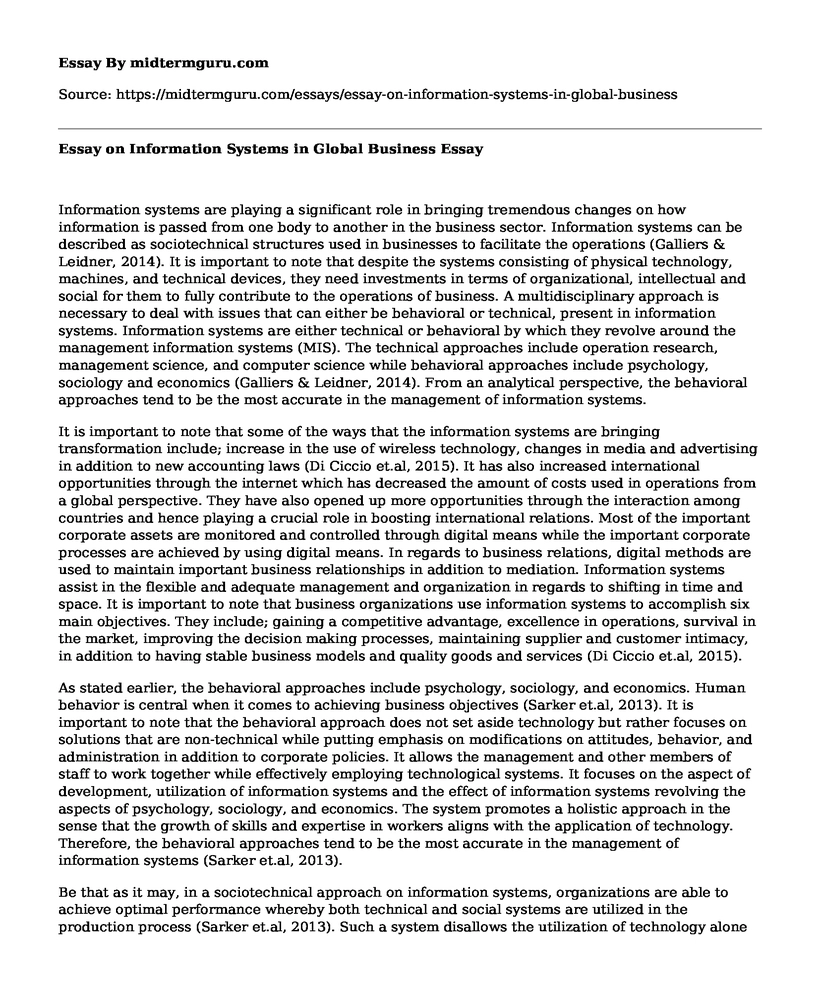Information systems are playing a significant role in bringing tremendous changes on how information is passed from one body to another in the business sector. Information systems can be described as sociotechnical structures used in businesses to facilitate the operations (Galliers & Leidner, 2014). It is important to note that despite the systems consisting of physical technology, machines, and technical devices, they need investments in terms of organizational, intellectual and social for them to fully contribute to the operations of business. A multidisciplinary approach is necessary to deal with issues that can either be behavioral or technical, present in information systems. Information systems are either technical or behavioral by which they revolve around the management information systems (MIS). The technical approaches include operation research, management science, and computer science while behavioral approaches include psychology, sociology and economics (Galliers & Leidner, 2014). From an analytical perspective, the behavioral approaches tend to be the most accurate in the management of information systems.
It is important to note that some of the ways that the information systems are bringing transformation include; increase in the use of wireless technology, changes in media and advertising in addition to new accounting laws (Di Ciccio et.al, 2015). It has also increased international opportunities through the internet which has decreased the amount of costs used in operations from a global perspective. They have also opened up more opportunities through the interaction among countries and hence playing a crucial role in boosting international relations. Most of the important corporate assets are monitored and controlled through digital means while the important corporate processes are achieved by using digital means. In regards to business relations, digital methods are used to maintain important business relationships in addition to mediation. Information systems assist in the flexible and adequate management and organization in regards to shifting in time and space. It is important to note that business organizations use information systems to accomplish six main objectives. They include; gaining a competitive advantage, excellence in operations, survival in the market, improving the decision making processes, maintaining supplier and customer intimacy, in addition to having stable business models and quality goods and services (Di Ciccio et.al, 2015).
As stated earlier, the behavioral approaches include psychology, sociology, and economics. Human behavior is central when it comes to achieving business objectives (Sarker et.al, 2013). It is important to note that the behavioral approach does not set aside technology but rather focuses on solutions that are non-technical while putting emphasis on modifications on attitudes, behavior, and administration in addition to corporate policies. It allows the management and other members of staff to work together while effectively employing technological systems. It focuses on the aspect of development, utilization of information systems and the effect of information systems revolving the aspects of psychology, sociology, and economics. The system promotes a holistic approach in the sense that the growth of skills and expertise in workers aligns with the application of technology. Therefore, the behavioral approaches tend to be the most accurate in the management of information systems (Sarker et.al, 2013).
Be that as it may, in a sociotechnical approach on information systems, organizations are able to achieve optimal performance whereby both technical and social systems are utilized in the production process (Sarker et.al, 2013). Such a system disallows the utilization of technology alone in the MIS. It is important to note that technology requires new changes and new designs for the purpose of fitting the needs of both the organization and the members of staff. The individuals and various parts of an organization also require change which can be achieved by learning, training in addition to planning changes in the organization for the purpose of fully adapting technology to achieve progress (Sarker et.al, 2013).
References
Di Ciccio, C., Marrella, A., & Russo, A. (2015). Knowledge-intensive processes: characteristics, requirements and analysis of contemporary approaches. Journal on Data Semantics, 4(1), 29-57.
Galliers, R. D., & Leidner, D. E. (2014). Strategic information management: challenges and strategies in managing information systems. New York: Routledge.
Sarker, S., Xiao, X., & Beaulieu, T. (2013). Guest editorial: qualitative studies in information systems: a critical review and some guiding principles. MIS Quarterly, 37(4), iii-xviii.
Cite this page
Essay on Information Systems in Global Business. (2021, Jun 10). Retrieved from https://midtermguru.com/essays/essay-on-information-systems-in-global-business
If you are the original author of this essay and no longer wish to have it published on the midtermguru.com website, please click below to request its removal:
- Servant Leadership in Nursing Team
- Barriers to TQM Strategies in King Abdul Aziz University Hospital
- Integrating Saudi Market - Marketing Essay Sample
- Essay on Discretionary Planning in UK Housing
- Discussion Questions on Business Administration - Paper Example
- Assignment Example on Strategic Management
- Paper Example on Characterizing a Typical User of the Product







